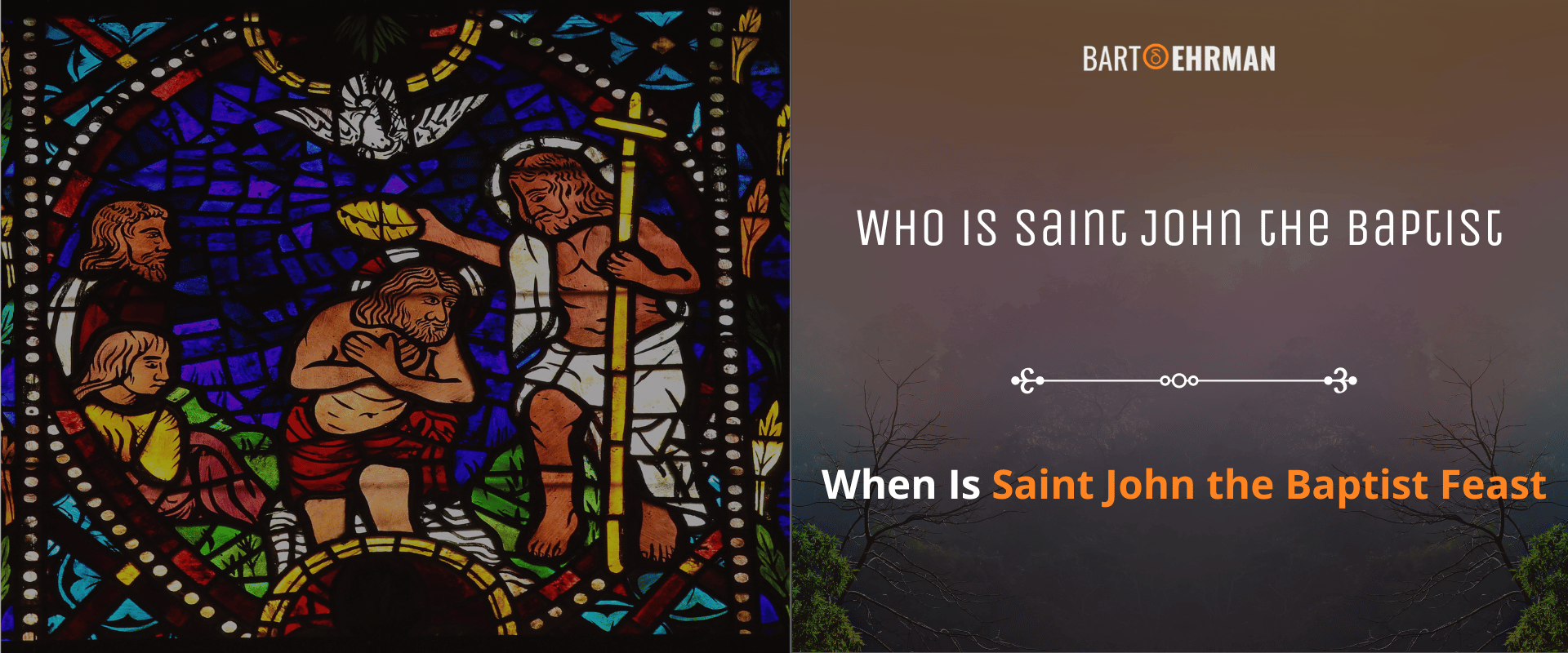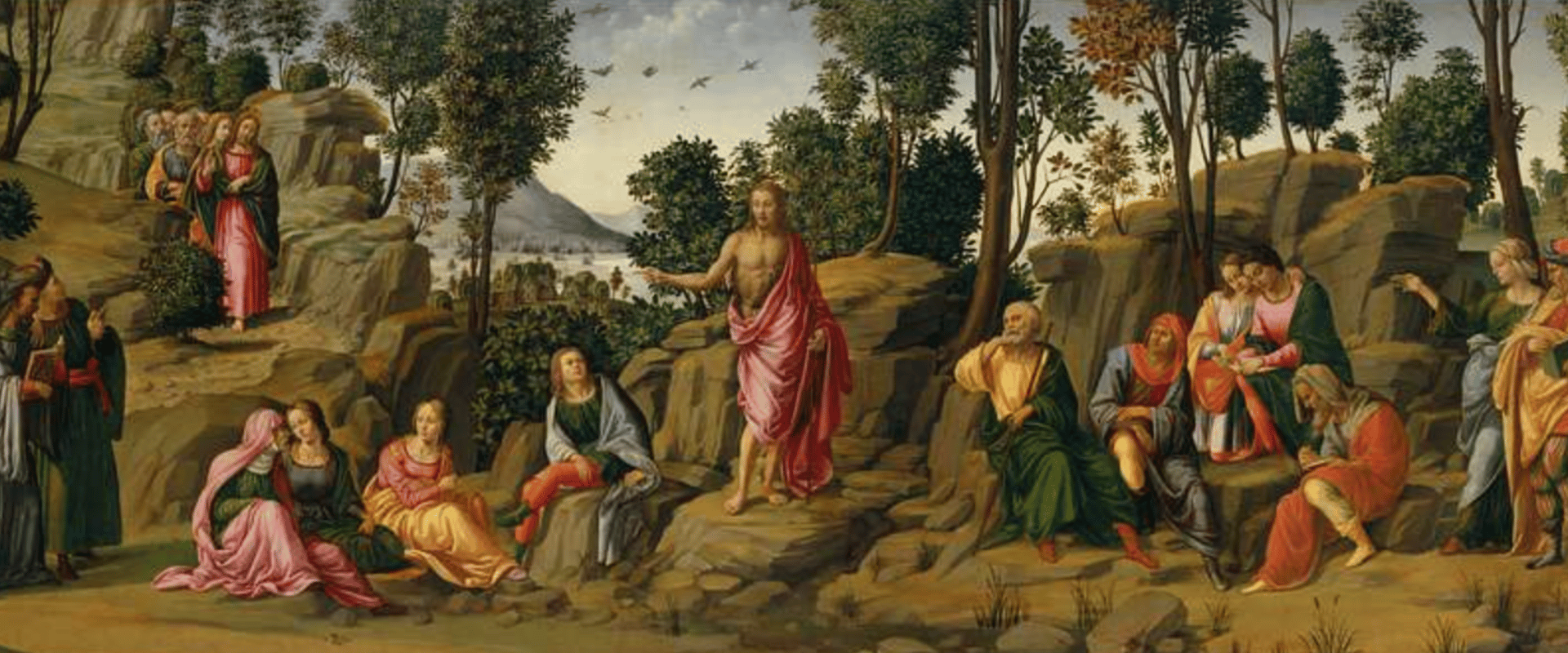Who is Saint John the Baptist? The Sainthood of an Important Biblical Figure

Written by Joshua Schachterle, Ph.D
Author | Professor | Scholar
Author | Professor | BE Contributor
Verified! See our editorial guidelines
Verified! See our guidelines
Date written: August 9th, 2023
Disclaimer: The views and opinions expressed in this article belong to the author and do not necessarily match my own. - Dr. Bart D. Ehrman
Who is Saint John the Baptist, and what makes him a saint?
To start with, let’s look at the information provided in the four Gospels. John the Baptist was an ascetic preacher who lived in Palestine in the early 1st century CE at the same time as Jesus of Nazareth. Scholars know John had a baptismal ministry, and Jesus probably started as John’s disciple.
Now, let’s dig into how John the Baptist attained sainthood. Furthermore, we are exploring the origins of the concept of sainthood altogether.
If you are interested in learning more about early Christianity, Bart has a free 50-minute webinar that explores the gospels. Just click this link.

Martyrdom
Lawrence Cunningham notes that the concept of sainthood is closely tied to the idea of martyrdom for early Christians. The word martyr comes from a Greek word meaning “witness.” It is a legal term for someone who gave evidence or testimony at a trial.
Early Christians use this label to describe Christians who died for their faith. Why? By refusing to recant their faith despite torture and death, they display evidence of its truth and power.
A text from the 2nd century called The Martyrdom of Polycarp provides evidence for the tradition of sainthood. In this text, observers laid Polycarp to rest after witnessing the gruesome death he endured for the sake of his faith.
However, the story doesn’t end there. Christians visit Polycarp’s grave “to gather together in joy and gladness to celebrate the day of his martyrdom as a birthday.” In other words, dying for one’s Christian faith is viewed as a kind of transformation rather than an ending. The martyr is thus reborn as a holier being: a saint.
Some early Christian texts speak of ceremonies at the martyrs’ tombs with Scriptural readings and prayers. This seems to be the origin of the practice of venerating saints. Later, there were elaborate practices of revering the mortal remains of deceased saints, known as relics.
I’ll discuss this later.
Two Ways Early Christians Became Saints
John became a saint in the Pre-Congregation period, which means there wasn’t yet an official process for canonizing saints. So how did early Christian figures become saints?
First, one could be called a saint by playing an important part in the story of Jesus in the Gospels. This includes Jesus’s disciples, of course, and others depicted in the Gospels. However, this also includes figures from the Hebrew Bible who clearly never met Jesus when he was alive.
Patriarchs like Abraham, Isaac, and Jacob and prophets, some of whom are said to predict Jesus’s story, are included. Early Christians consider all these figures important in what would ultimately become Jesus’s own story.
Second, one could be considered a saint by becoming a martyr for the Christian faith. This includes Stephen, often considered the first Christian martyr, from Acts 7:54-60. It also includes later Christians who died violent deaths without relinquishing their faith.
I wrote an article about the life, ministry, and death of John the Baptist earlier this month for those of you looking to supplement this post.
So, what does all this have to do with John the Baptist?
Why is John the Baptist Important: He meets both Criteria
Why was John the Baptist important? While we know that John had his own ministry, the Gospels portray him principally as the forerunner to Jesus’s ministry. Early Christians read about John in the Gospels and considered him a saint because of his importance to Jesus’s story.
Another reason related to the concept of saints’ history is that John was killed. In other words, he is a martyr. True, he wasn’t killed for professing faith in Jesus. However, he was, says the Gospel of Mark, killed for publicly admonishing the king for marrying the wife of the king’s brother. John may not have technically been a martyr for Jesus, but he is a martyr for his faith and ethics.
How do Christians Honor Saint John the Baptist?
The birthplaces of saints are often memorialized with shrines or other monuments. So where was John the Baptist born? Unfortunately, there is no archeological evidence to tell us this. However, his birthplace is traditionally ascribed to a small village in Palestine called Beth Hakerem (“House of the Vineyard”). It is now called Ein Karem and is the principal place where pilgrims honor Saint John the Baptist.
In the 4th century, Helena, mother of Constantine, the first Christian emperor of Rome, visited this village. According to tradition, she had her son build the Church of the Visitation there in honor of John the Baptist. The church is believed to be situated on the very spot where John’s childhood home once stood.
Christian pilgrims have visited this site for centuries to venerate Saint John the Baptist. They built churches and monasteries to acknowledge his significance in Christianity.
Saint John the Baptist Feast Day: When is it?
In the Catholic and Orthodox Churches, Christian saints are held in high esteem and are given a specific day of celebration, known as a feast day. The term “feast day” stems from the Latin word “festes,” which means a time of celebration or holiday.
St. John’s Feast Day is believed to be aligned with his birth on June 24th. Interestingly, in the Roman Calendar, this date coincides with the Summer Solstice – the longest day of the year in the Northern Hemisphere. This symbolism is often linked to John’s own words found in the Gospel of John, where he states, “He must increase, but I must decrease” (John 3:30).
Feast days are of great significance as they provide an occasion for followers to honor and remember the lives of saints.

What is John the Baptist Patron Saint Of?
A patron saint is one dedicated to protection and guidance. The church often assigns Saints to certain places, professions, and areas of endeavor.
For Catholics, John is the patron saint of baptism, bird dealers, converts, monastic life, motorways, printers, tailors, lambs, and prisoners. In the Eastern Orthodox Church, he is the patron saint of godparents.
Relics
In Catholic and Orthodox churches, relics refer to the physical remains of a saint, such as their body parts, clothing, belongings, or even torture instruments. They are highly revered.
According to Peter Brown, early Christians believed relics held the power of saints. Simply being in the presence of these relics allowed one to connect with the earthly and heavenly realms. As a result, people would visit relics, touch them if possible, and pray for the saint’s intercession.
So, what relics do we have of John the Baptist?
John the Baptist, known for his beheading, has an intriguing story surrounding his detached head. Interestingly, four locations, including Rome, Paris, Munich, and a mosque in Damascus, each assert possession of his skull. It is worth noting that John, like many revered figures from the Hebrew Bible and New Testament, is also regarded as a prophet in Islam.
Another tradition says that John’s body is buried in a crypt beneath the ruins of the Cathedral of Saint John the Baptist in a Palestinian city called Sebastia.
Conclusion: Who is Saint John the Baptist?
Historically, John the Baptist was a Jewish preacher and baptizer living in the desert in 1st-century Palestine. He had many followers, among them Jesus of Nazareth. However, he eventually came to be revered as a saint in the Christian tradition.
How did this happen?
John met two of the criteria for Christian sainthood. First, he played a significant role in the story of Jesus, as depicted in the Gospels, serving as Jesus’s forerunner. Secondly, he was martyred and killed for his faith and unwavering morality.
Today, John is honored by pilgrims who visit his traditional birthplace in the village of Ein Karem. Moreover, Catholics and Orthodox Christians venerate him through relics and seek his intercession with God.
To commemorate his life, the Feast Day of St. John the Baptist is celebrated, marking his birthday and significance in the Christian tradition.
Looking for more insight into the gospels? Take a closer look from a scholarly perspective with Bart Ehrman today. Click on the link below!

